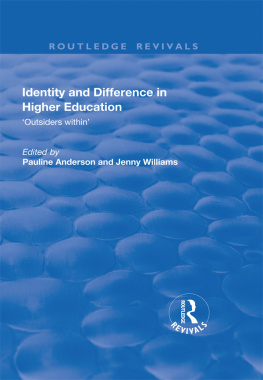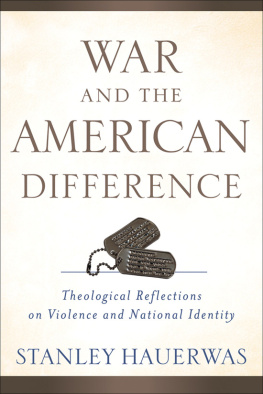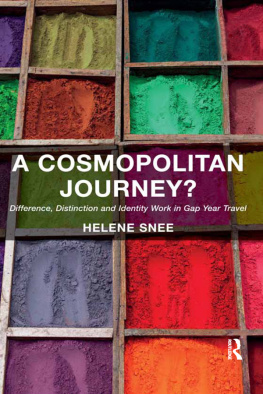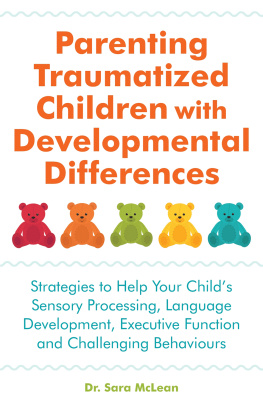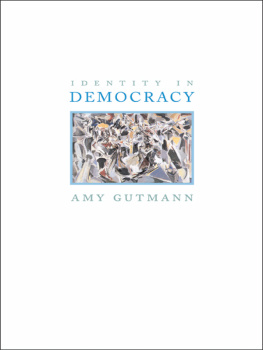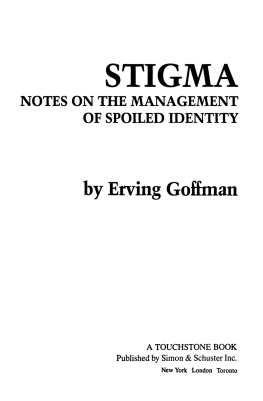Contents
Guide
Pages

Encountering Difference
Diasporic Traces, Creolizing Spaces
Robin Cohen and Olivia Sheringham
polity
Copyright Robin Cohen & Olivia Sheringham 2016
The right of Robin Cohen & Olivia Sheringham to be identified as Authors of this Work has been asserted in accordance with the UK Copyright, Designs and Patents Act 1988.
First published in 2016 by Polity Press
Polity Press
65 Bridge Street
Cambridge CB2 1UR, UK
Polity Press
350 Main Street
Malden, MA 02148, USA
All rights reserved. Except for the quotation of short passages for the purpose of criticism and review, no part of this publication may be reproduced, stored in a retrieval system, or transmitted, in any form or by any means, electronic, mechanical, photocopying, recording or otherwise, without the prior permission of the publisher.
ISBN-13: 978-1-5095-0883-9
A catalogue record for this book is available from the British Library.
Library of Congress Cataloging-in-Publication Data
Names: Cohen, Robin, 1944- author. | Sheringham, Olivia, 1981- author.
Title: Encountering difference : diasporic traces, creolizing spaces / Robin Cohen, Olivia Sheringham.
Description: Cambridge, UK ; Malden, MA : Polity Press, 2016. | Includes bibliographical references and index.
Identifiers: LCCN 2015042065| ISBN 9781509508792 (hardback : alk. paper) | ISBN 9781509508808 (pbk. : alk. paper)
Subjects: LCSH: Cultural fusion. | Assimilation (Sociology) | Emigration and immigration--Social aspects.
Classification: LCC HM1272 .C64 2016 | DDC 306--dc23 LC record available at http://lccn.loc.gov/2015042065
The publisher has used its best endeavours to ensure that the URLs for external websites referred to in this book are correct and active at the time of going to press. However, the publisher has no responsibility for the websites and can make no guarantee that a site will remain live or that the content is or will remain appropriate.
Every effort has been made to trace all copyright holders, but if any have been inadvertently overlooked the publisher will be pleased to include any necessary credits in any subsequent reprint or edition.
For further information on Polity, visit our website: politybooks.com
Acknowledgements
Robin Cohen wishes to thank research participants and friends in Cape Verde, Mauritius, Louisiana and Guadeloupe, including Maria Cndida Gonalves, Vijaya Teelock, Lindsey Collen, Ram Seegobin, Robbie and Catherine Stephen, Arnaud Carpooran, C. Le Cartier, J. F. Lafleur, Rosebelle Boswell, Loran Medea, Sheila Richmond, Mary Gehman, Susan Dollar, Peter Gregory, Monique Bouyer, Terrence Mosley, Mary Wernet, Kathe Hambrick-Jackson, David I. Beriss, Michael S. Martin, Julien Merion and Rose-Lee Raqui.
Olivia Sheringham wishes to thank all her research participants and friends in Martinique, Guadeloupe and Cape Verde, including Richard and Sally Price, Dominique Aurelia, Paulo Athanse, Patricia Donatien, Pascale Lavanaire, Gerry LEtang, Gilles Alexandre, Roberte Verdan, Roger de Jaham, Patrick Chamoiseau, Christiane Emmanuel, Suzanne Laurent and Barbara Colombe in Martinique; Gerard Delver, Fred Reno, Lna Blou, Rose-Lee Raqui, Emmanuel Ibn, Alijah, Carole, Nicole de Surmont, Julien Merion and Bernard Phipps in Martinique and Guadeloupe; and Josina Freitas, Joo Fortes, Manuel Lima Fortes, Tambla Almeida, Margarida Martins, Moacyr Rodrigues, Celeste Fortes, Manu Cabral, Kiki Lima and Jorge Martins in Cape Verde.
Interviews in French and Portuguese were conducted by Olivia Sheringham in Martinique and Cape Verde. (She has provided her own translations.) Interviews in Mauritius and Louisiana were conducted by Robin Cohen. To minimize the number of endnotes, we have simply indicated in the text that the source of information is an interview. Where appropriate, individuals have been identified by name.
On a personal note Olivia would like to thank Emma Klinefelter and James and Leo Cattell, while Robin likewise extends his thanks to Selina Molteno Cohen and Jason Cohen. He gives a special thank you to Paola Toninato, his co-editor on The Creolization Reader (2010).
Both authors wish to thank the Leverhulme Trust for funding this research (Grant number F/08/000/H) and the Oxford Diasporas Programme (http://www.migration.ox.ac.uk/odp/). Zoe Falk, Claire Fletcher, Jenny Peebles and Sally Kingsborough provided administrative and editorial support to us and to the programme at large. Colleagues who provided critiques and support include Josh de Wind, Khachig Tllyan, Steve Vertovec, Ian Goldin, Nick Van Hear, Peggy Levitt, Jrgen Carling, Ralph Grillo, Denis Constant Martin and Edgar Pieterse. We particularly profited from Thomas Hylland Eriksens detailed reading of the manuscript.
We wish to acknowledge that some of the material in is reproduced from an article published in Ethnic and Racial Studies, February 2016.
A Note on Usage
Creole(s) (with a capital letter) refers to a person or people who are so identified by others or self-identify using that description.
When it appears in lower case, creole is used adjectively, as in a creole language or creole food.
The popular language in Cape Verde is Krioulu, which in Martinique is Kryol. Krio is widely spoken in Sierra Leone, while the majority of people in Mauritius speak Kreol.
Framing the Question: A Preamble
Jamaican-born Stuart Hall, who died in 2014, was one of Britains most perceptive and revered public intellectuals. Asked to define the key issue of the twenty-first century, he responded as follows:
How are people from different cultures, different backgrounds, with different languages, different religious beliefs, produced by different and highly uneven histories, but who find themselves either directly connected because theyve got to make a life together in the same place, or digitally connected because they occupy the same symbolic worlds how are they to make some sort of common life together without retreating into warring tribes, eating one another, or insisting that other people must look exactly like you, behave exactly like you, think exactly like you?
This book addresses Stuart Halls question. It is, of course, all too easy to list the countless examples of conflict between different ethnicities, nationalities and religions. News bulletins are replete with militant demands for ethnic exclusivity, minority-language education, religious orthodoxy and territorial separatism. Think, for example, of the conflicts between Kosovars and Serbs in the Balkans, Hutu and Tutsi in Rwanda, Christians and Muslims in Lebanon, Jews and Palestinians in the Middle East, Tamils and Sinhalese in Sri Lanka, Protestants and Catholics in Northern Ireland, Alawi, other Shias and Sunni in Syria or Russians and Ukrainians in eastern Ukraine. Instead of focusing on the many forms of ethnic and religious conflict, the potency of which we do not contest, this book is centred on how, when and where people of diverse heritages meet and converge, and why understanding this more positive outcome might be important for the future of humankind.
We decided to pursue a number of complementary strategies. We reasoned that new social identities arise at the formative moment of meeting (when initial stereotypes are generated), identities that become modified as encounters deepen and become more multifaceted. Social actors bring to these thicker encounters what they cannot let go from their pasts and what they need to absorb, or want to embrace, from their present situations and contexts. This line of thinking induced us to develop and refine three seminal concepts social identity formation, diaspora and creolization, all of which we delineate in .


